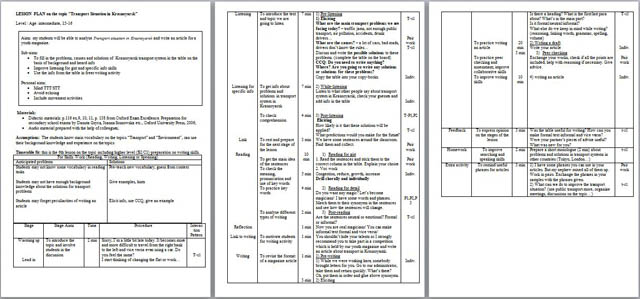План урока составлен в соответствии с международными требованиями, включая цели, задачи, описание деятельности на каждом этапе урока. Я использовала видео, на котором записала на планшет коллег учителей английского языка (за неимением иностранцев), которые были в гостях в нашем городе. Они рассказали о тех проблемах с транспортом, с которыми столкнулись в нашем городе и путях их решения. Это стало отправной точкой для дальнейшей работы на уроке.
Ребята в группах с помощью "мозгового штурма" добавили проблемы, пути их решения и реальные возможности по их воплощению в таблицы, а потом использовали информацию для написания доклада. Предварительно, мы разбираем особенности данного вида текста, логичность и критерии оценивания подобного вида работ.
На мой взгляд, урок, а точнее 2 урока (план рассчитан на 90 минут) получился достаточно логичным, ребята были активны и замотивированы на работу на каждом этапе и продукты (доклады) получились очень содержательными. Материал может быть адаптирован и для более старших учащихся, а также для подготовки к письменному или устному разделу выпускных экзаменов.
Самое главное, на мой взгляд, что ребята учатся "упаковывать" имеющиеся знания и полученную информацию в формат таблицы и использовать данную информацию в соответствии с целями.
Aims:
my students will be able to analyse Transport situation in Krasnoyarsk and write an article for a youth magazine.
Sub-aims:
To fill in the problems, causes and solutions of Krasnoyarsk transport system in the table on the basis of background and heard info;
Improve listening for gist and specific info skills;
Use the info from the table in freer writing activity;
Stage.
Warming up.
To introduce the topic and involve students in the discussion.
Sorry, I’m a little bit late today. It becomes more and more difficult to travel from the right bank to the left and vice versa even using a car. Do you feel the same?
Lead in.
I start thinking of changing the flat or work…
Listening.
To introduce the text and topic we are going to listen.
1) Pre-listening
1) Eliciting
What are the main transport problems we are facing today? – traffic jams, not enough public transport, air pollution, accidents, drunk drivers…

What are the causes? – a lot of cars, bad roads, drivers don’t know the rules…
Discuss and write the possible solutions to these problems. (complete the table on the board)
CCQ: Do you need to write anything? Where? Are you going to write any solutions or solutions for these problems?
Copy the table into your copy-books.
Listening for specific info.
To get info about problems and solutions in transport system in Krasnoyarsk.
2) While-listening
Listen to what other people say about transport system in Krasnoyarsk, check your guesses and add info in the table.
3) Post-listening
Eliciting
How likely is it that these solutions will be applied?
What predictions would you make for the future?
Link.
To rest and prepare for the next stage of the lesson.
We have some sentences around the classroom. Find them and collect.
Reading.
To get the main idea of the sentences.
To check the meaning, pronunciation and use of key words.
To practice key words.
1) Reading for gist
1. Read the sentences and stick them to the correct column in the table. Explain your choice.
2. Voc work
Congestion, reduce, growth, increase
Drill chorally and individually
2) Reading for detail
Do you want any magic? Let’s become magicians! I have some words and phrases. Match them to their synonyms in the sentences and see how the sentences will change.
Весь материал - в документе.

 Получите свидетельство
Получите свидетельство Вход
Вход












 План урока по английскому языку на тему "Transport Situation in Krasnoyarsk" (70 КB)
План урока по английскому языку на тему "Transport Situation in Krasnoyarsk" (70 КB)
 0
0 612
612 8
8 Нравится
0
Нравится
0


